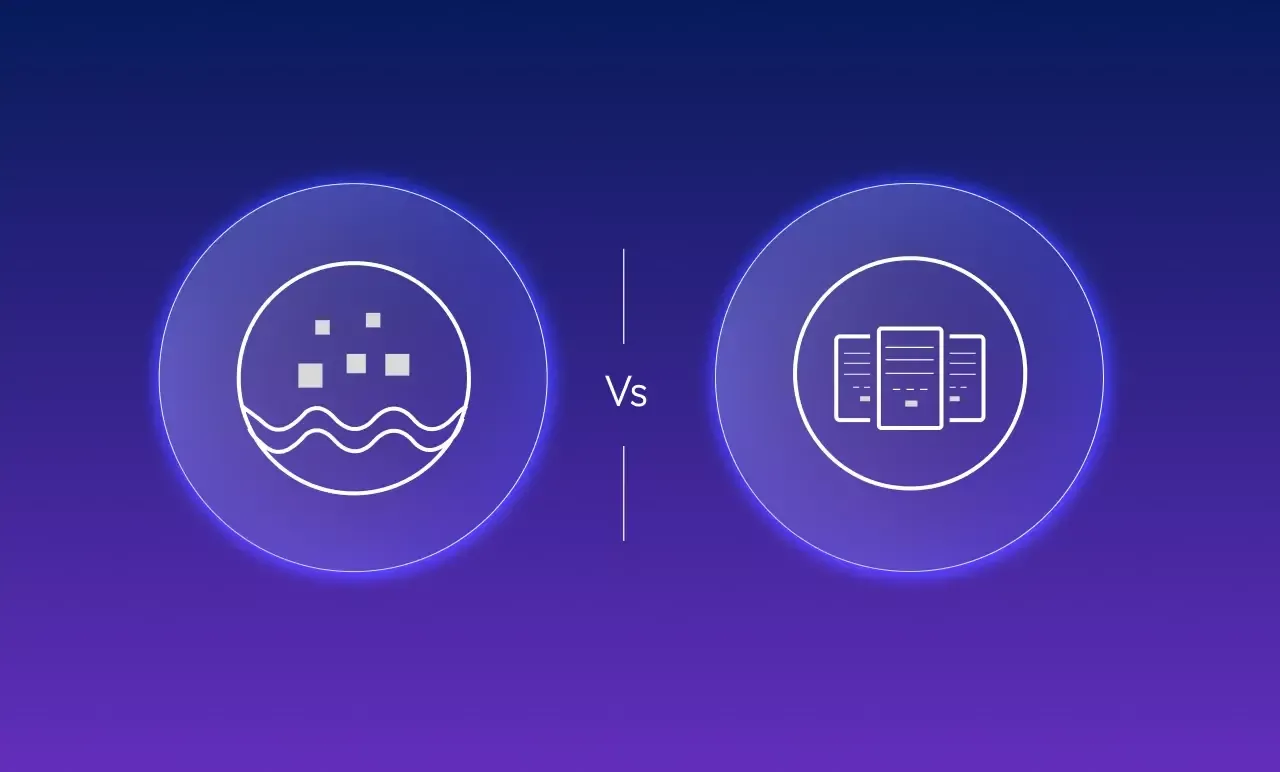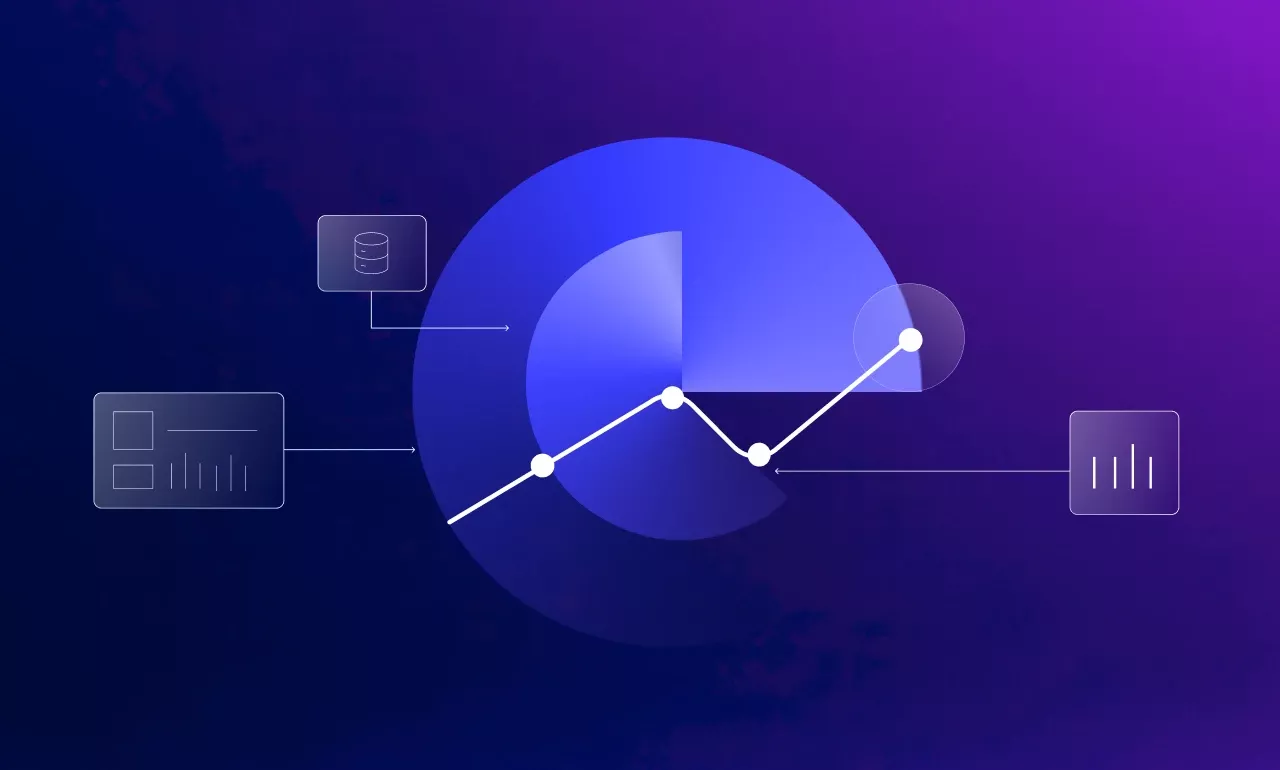Data Storage Decoded: Data Warehouse vs Data Lake Explained
Customer Database Management: 8 Best Practices to Make You Future-Ready
Effective customer database management (CDM) is the backbone of turning scattered data into business gold. It is the process of collecting, organizing, and utilizing customer information to drive insights, enhance engagement, and boost business growth.
It involves the tools and strategies used to gather data while ensuring ethical and secure handling.
From website interactions to purchase history, effective CDM turns raw data into actionable insights that power personalized experiences and foster customer trust.
With a robust customer data management system, businesses can organize, analyze, and secure this data. This enables teams to create personalized campaigns, boost conversions, and drive loyalty.
However, managing this data effectively requires more than just collection. It demands organization, analysis, and a focus on data security and privacy.
So, how can you safeguard and optimize your customer data for maximum impact?
Explore these key strategies for long-term success.
Top 8 Customer Database Management Practices for 2025 and Beyond
The true importance of customer data management can only be realized when you prioritize the best practices to perfect your CDM process.
Here are 8 pointers to look out for.
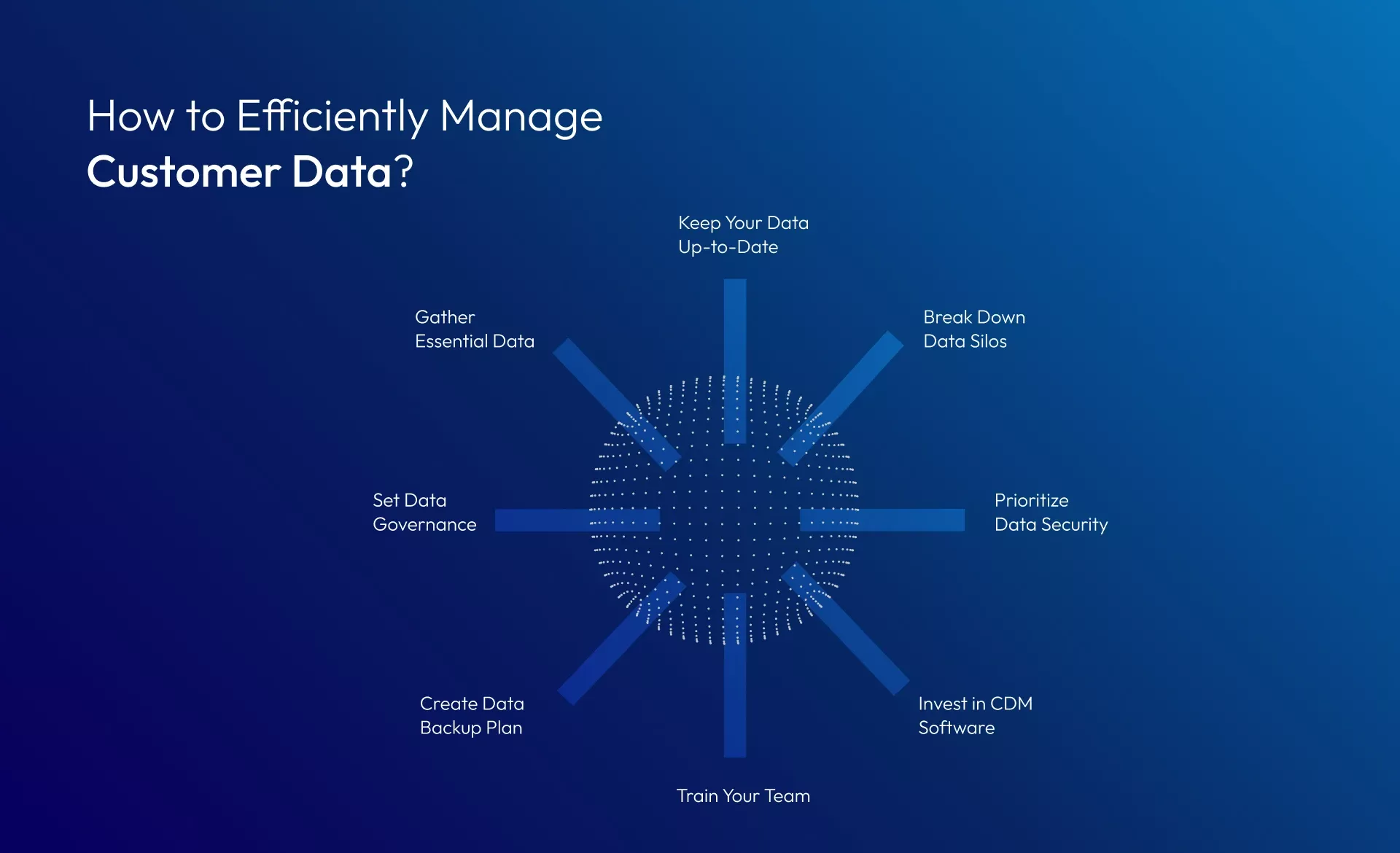
Establish a Data Governance Strategy
Data governance is the cornerstone of effective customer data management because it establishes guidelines for what data will be collected and how it will be handled. A well-defined data governance strategy ensures that all employees are aligned and understand the company’s approach to customer data management.
Every data governance strategy should include three main components:
- Alignment: Standardizes customer data collection across the organization to ensure consistency and accuracy.
- Validation: Confirms that all data is being collected correctly and meets required standards.
- Enforcement: Establishes processes to implement changes in data collection and ensures that collected data is used correctly.
The end result of a robust data governance strategy is a detailed tracking plan, or data dictionary, that clearly defines each data element. It outlines who collects the data, who uses it, what it’s used for, and who is accountable for its management.
Focus on Essential Data for Your Customer Database
To maintain an effective customer database management system, it’s crucial to collect only data that is truly useful to your business. Gathering unnecessary data can overwhelm your customer data platform (CDP) and potentially lead to discomfort for customers. Regularly audit the data in your database and ask these questions:
- Who needs this data?
- What is its purpose? What does it enable or facilitate?
- Could we function just as well without it?
If the answers to these questions aren’t clear, consult with your team to understand if there’s a valid use case for keeping the data. For instance, if some data about website visitors’ revenue doesn't serve a specific business need, it's best to remove it. Collecting irrelevant data can lead to complications. This has been highlighted by recent issues faced by a publicly traded company for retaining unnecessary customer data even after their service had ended.
Keep Your Data Up-to-Date
With so much information being generated every day, customer data naturally becomes outdated over time. This can lead to inaccuracies that can harm both your budget and customer trust.
To ensure data is accurate and valuable, regular cleansing is crucial.
This means,
- Validating and updating contact details
- Removing duplicates
- Eliminating inactive or irrelevant entries
Start with a data audit to identify what you have, then centralize your data across departments and ensure consistent formatting.
Automated data-validation tools, integrated with your CRM, make the process easier and more efficient.
By prioritizing data cleansing, you improve data quality, streamline workflows, and enhance customer relationships, ultimately ensuring your business makes informed, confident decisions.
Break Down Data Silos
Customers interact with brands across multiple touchpoints - stores, websites, social media, and ads - expecting a seamless experience.
However, data silos, where departments collect but don’t share information, hinder collaboration and limit valuable insights, impacting customer service, marketing, and overall business efficiency.
Digital transformation tackles this challenge by:
- Integrating processes and using tools like Customer Data Platforms (CDPs) to unify data into comprehensive profiles
- Empowering teams to personalize marketing, improve decision-making, and streamline workflows with AI-driven automation.
Maintaining clean, accurate data through regular updates, duplicate removal, and centralized systems ensures reliable insights and fosters customer trust. Breaking down silos enables a connected, data-driven approach that enhances experiences and drives growth.
Don’t Compromise on Data Security
When handling customer data, it’s crucial to prioritize security. A data breach can cost businesses millions per incident.
To protect personal data, whether it’s home phone numbers, addresses, or financial details, a strong plan is essential to build customer trust and avoid significant headaches.
To secure customer data:
- Invest in a CRM
- A backup system
- Employee training on data security.
Frequent high-profile breaches demonstrate the importance of these measures, and the fines for non-compliance are a risk across countries. Therefore, ensure your customer data platform follows a government-approved security program to maintain rigorous data protection standards.
Invest in Customer Database Management Software to Stay Compliant
Spreadsheets are no longer enough for managing customer data effectively.
Businesses need secure, scalable solutions like custom-built customer database management tools that provide a unified view of customer interactions.
These tools help focus on critical insights and improve efficiency by:
- Simplifying data management
- Enhancing analytics
- Automating tasks
- Centralizing information
- Offering customizable data fields
With all data in one place, teams can streamline workflows, avoid scattered information, and focus on building stronger customer relationships.
Tailored solutions and expert consultations can help businesses get started with a system that meets their unique needs and ensures compliance with data regulations like GDPR.
Train Your Team to Handle Customer Data Effectively
Investing in employee training can prevent costly mistakes and ensure effective data management.
A well-informed team can effectively handle, interpret, and protect customer data, turning company policies into actionable practices.
This is especially important for businesses with BYOD (Bring Your Own Device) policies, where employees use personal devices for work. Clear, practical guidelines must be in place to safeguard sensitive information while remaining easy to follow.
By prioritizing training and clear policies, businesses can enhance data security, improve efficiency, and foster long-term growth.
Secure Your Business with a Robust Data Backup Plan
Data loss is a significant risk for businesses, and yet many SMBs are unprepared for it to this day, which may lead them to go out of business.
If you don't want your enterprise to be one of them, chalk out a comprehensive data backup and recovery plan to safeguard your customer information and your business.
Start by creating a secure backup of all data to protect against system failures or breaches.
Carefully select a fail-safe solution that ensures the safety and accessibility of your data. While developing your plan, consider these key questions:
- What is your data backup budget?
- Which backup solution best suits your business?
- Where will your backups be stored?
- What steps are included in your recovery process?
Regularly testing your customer database management system’s backup is crucial to ensure it functions properly when needed. A reliable backup strategy not only protects your customers’ data but also reinforces your business's reputation as a trustworthy partner.
Who Can Benefit from a Customer Database Management System?
Customer databases are powerful tools that cater to a wide range of industries, helping businesses and organizations efficiently manage interactions, optimize operations, and personalize experiences.
Here’s how different sectors leverage customer databases to their advantage:
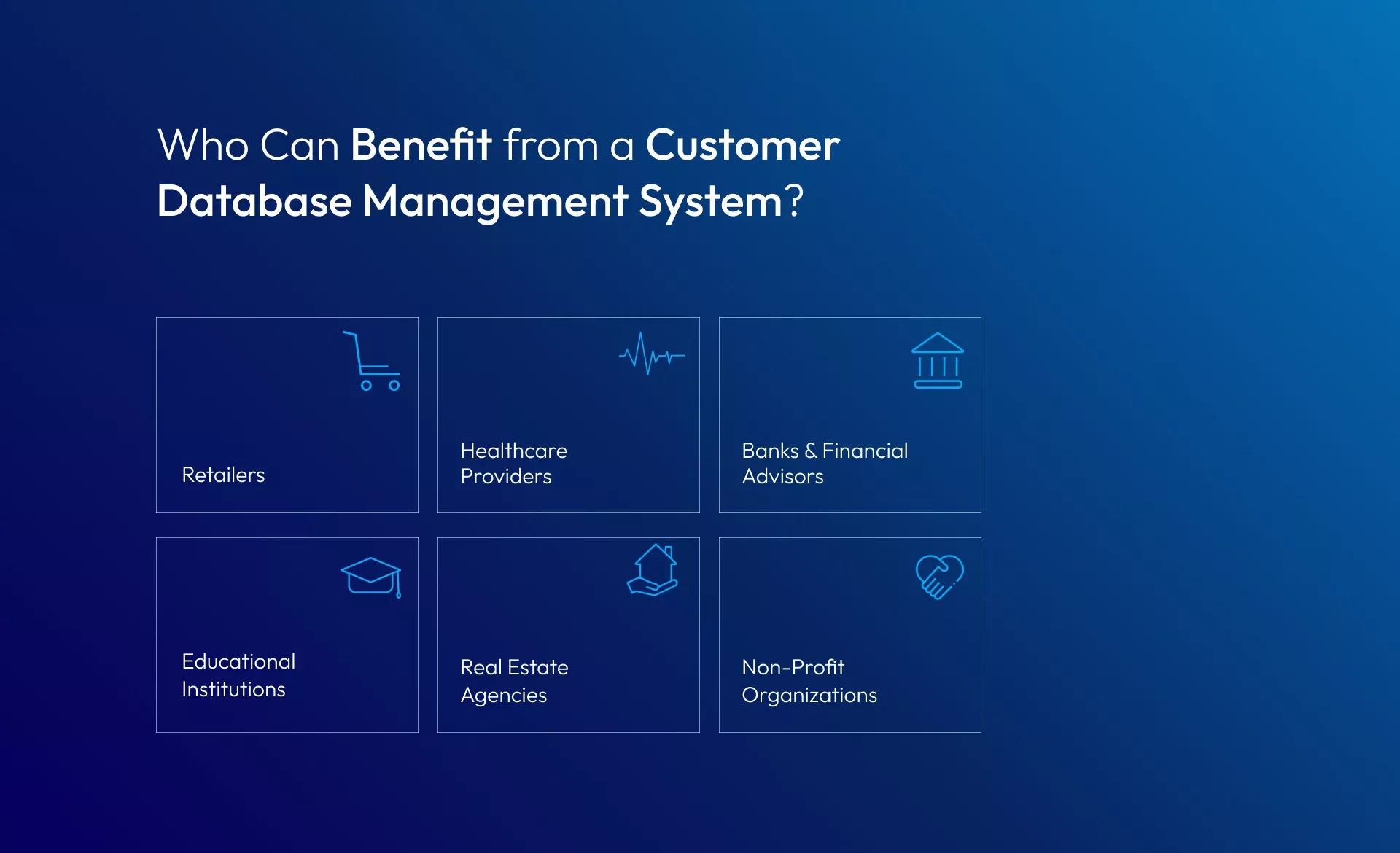
Retailers
Customer data empowers retailers to anticipate shoppers’ needs and deliver a seamless experience.
By analyzing purchasing trends, they can achieve a number of benefits.
Key Use Cases:
- Personalized product recommendations based on purchase history
- Real-time inventory optimization
- Customer segmentation for targeted marketing campaigns
Healthcare Providers
Customer database management systems are a significant part of the emerging automation in healthcare.
These databases ensure compliance with healthcare regulations, enable timely follow-ups, and provide personalized patient care.
Key Use Cases:
- Streamlined patient record management and efficient treatment plans
- Automated appointment reminders
- Improved coordination between healthcare professionals
Banks & Financial Advisors
For banks and financial advisors, customer databases are key to delivering seamless and secure financial services.
They depend on these databases to manage client portfolios, monitor financial transactions, and deliver personalized financial strategies.
Key Use Cases:
- Secure storage of client financial records
- Automated risk assessment and fraud prevention
- Personalized financial planning based on customer profiles
Educational Institutions
Schools and universities can use customer database management to efficiently store student information, grades, and attendance.
This is especially relevant in today's post-pandemic era where remote learning has made a mark as a convenient option that is highly opted for.
They also track alumni to strengthen networking and fundraising efforts, enhancing the institution’s community and resources.
Key Use Cases:
- Academic performance tracking and reporting
- Attendance and behavior monitoring
- Alumni engagement for events and donations
Real Estate Agencies
Real estate professionals can use customer data management in CRM systems and email marketing platforms to maintain and analyze client databases.
Key Use Cases:
- Maintaining property listings
- Property matching based on client preferences
- Automated reminders for follow-ups and appointments
- Seamless communication across multiple channels
Non-Profit Organizations
Customer databases help nonprofit organizations track donor contributions and engagement, enabling more effective fundraising strategies.
Key Use Cases:
- Donor tracking and engagement analytics
- Volunteer management and scheduling
- Targeted fundraising campaigns based on donor historyAcademic performance tracking and reporting
Key Benefits of Customer Data Management for Enterprises
Here is a list of customer database management system benefits that businesses can gain from its implementation:
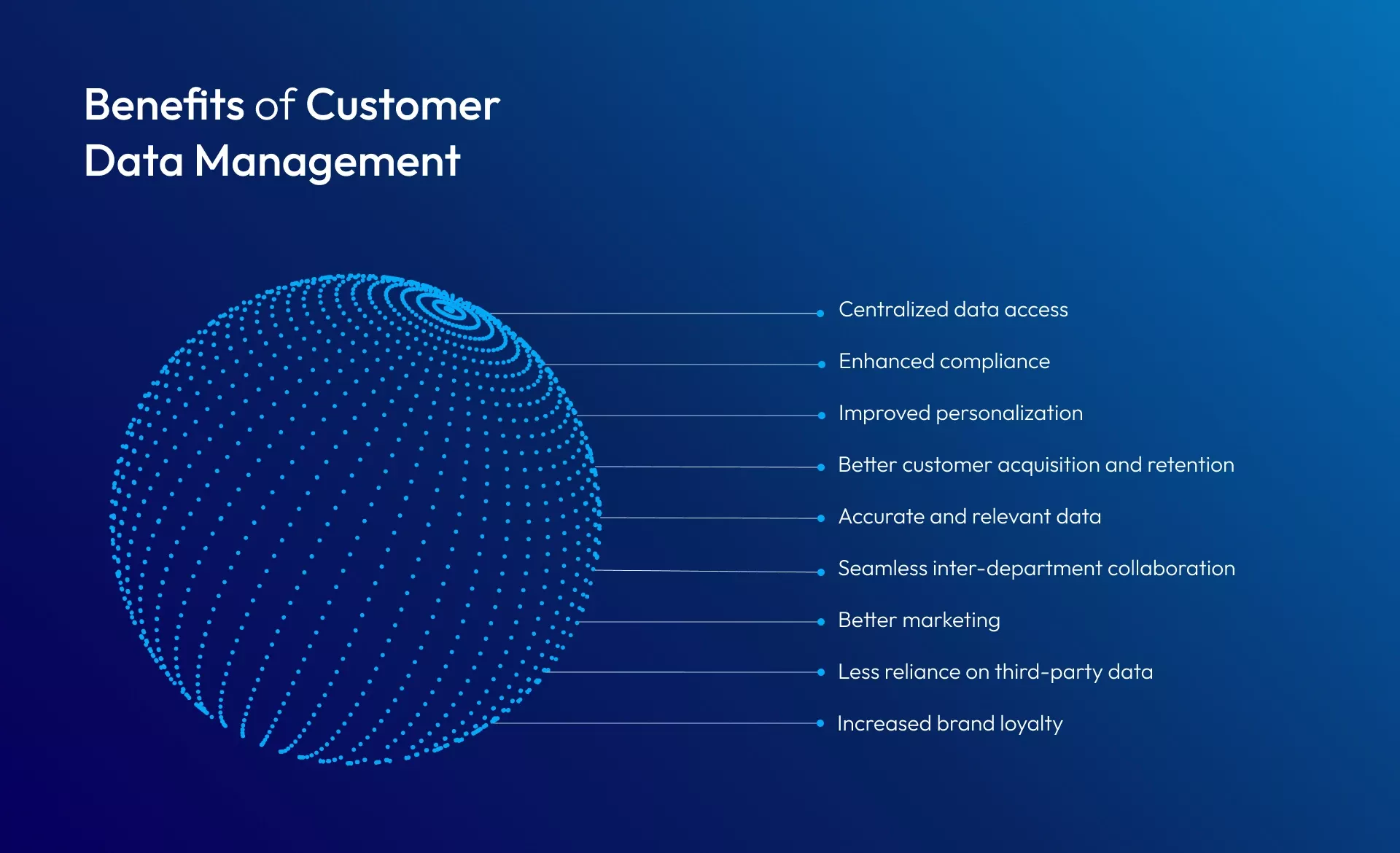
- Centralized data access
- Enhanced compliance
- Improved personalization
- Increased customer acquisition and stronger retention
- More accurate and relevant data
- Streamlined operations with enhanced collaboration across departments
- Better marketing with more upsell and cross-sell opportunities
- Reduced reliance on third-party data with direct customer interactions
- Increased brand loyalty
Wrapping Up…
Mastering customer data management is more than just understanding its importance; it's about taking proactive steps to future-proof your business.
By implementing best practices, you can unlock the true potential of your data, ensuring it remains accurate, secure, and actionable.
Assess your current approach, identify areas for improvement, and embrace the right strategies to drive growth and innovation.
With the right tools and a data-driven mindset, you can transform raw information into valuable insights that enhance customer experiences, boost operational efficiency, and keep you ahead in an ever-evolving market.
Email us or Talk to us at +91-98367-81929 or Simply Contact Us through the website.
Let's Connect


